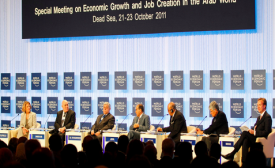middle east
Palestinian schoolchildren in the village of Kafr Sur in Tulkarem this week received footballs from Spanish giant FC Barcelona. The balls are apparently replacements for those lost over the separation fence between the West Bank and Israel over the years, the Guardian reported. A Spanish journalist, Anna Alba, who spoke about the “gift” said she hoped that it would encourage other teams to come to the area and support local athletes.
Successful public diplomacy is based on providing foreign publics what they need, be it information, a vaccination program, or help in securing economic well-being. A good example of working toward the latter can be found in a speech delivered by U.S. Assistant Secretary of State Anne Patterson in Jordan on February 25, during which she outlined some of the steps the United States is taking to "enhance regional trade and investment that will spur growth and jobs."
In his first public comments since stepping down as US ambassador to Syria on Friday, Robert Ford addressed the failure to contain Syria's bloody civil war, laying most of the blame at the feet of President Bashar al-Assad and his government's international backers. Speaking at a conference at Tufts University last night, his outlook was bleak, warning that a fractured rebellion, the presence of Al Qaeda inspired fighters on the battlefield, and the fears of the country's minorities are a recipe for prolonged conflict.

Successful public diplomacy is based on providing foreign publics what they need, be it information, a vaccination program, or help in securing economic well-being.
The five-day ultimatum by the leader of Jabaht al-Nusra (al-Nusra front) - Abu Mohammed al-Golani - to the leadership of the Islamic State of Iraq and the Levant (ISIL), and other Islamist factions, to end fighting or be "expelled" from the region is the latest in the troubled affair between the two al-Qaida affiliates in Syria.
Among the principal assets of U.S. public diplomacy are American values. They are admired around the world, even by many people who dislike American policy. No other political system offers such extensive individual and systemic freedoms as those enumerated in the Bill of Rights. Showcasing and standing up for those freedoms should be at the heart of U.S. public diplomacy.
The prospect of greater Chinese involvement in the Middle East peace process was raised in mid 2013 when Beijing invited both Israeli and Palestinian leaders for separate meetings to discuss the resumption of the Arab-Israeli peace process. Newly elected Chinese leader Xi Jinping used the meetings to unveil his four-point peace proposal for the settlement of the Palestinian issue.
Over the past few years, Sabir Nazar has emerged as Pakistan's best known cartoonist for drawing a series of cartoons that take a sharply critical look at religious orthodoxy, conspiracy theories, and misinterpretations of current affairs that feed into the Pakistani mass consciousness. Through cartoons and comments posted on the social networking site Facebook, he offers biting insights that turn commonly-held viewpoints and beliefs about Pakistan on their heads.







